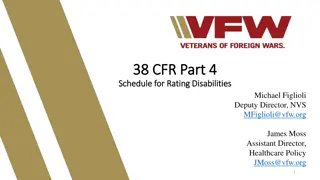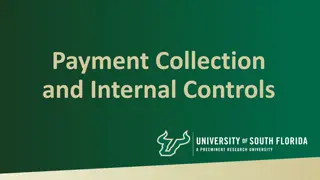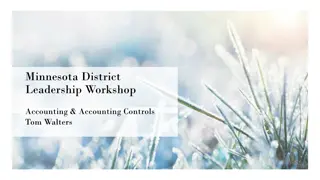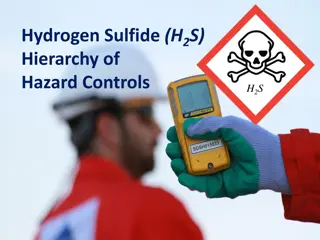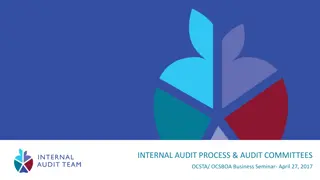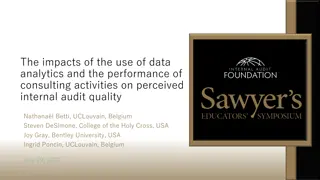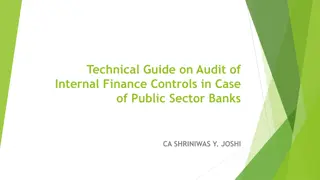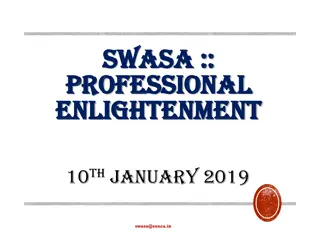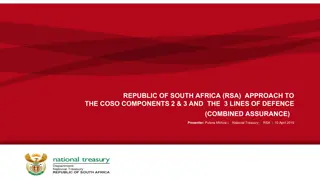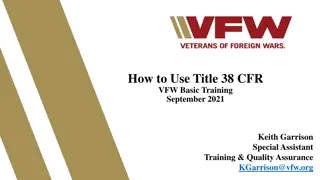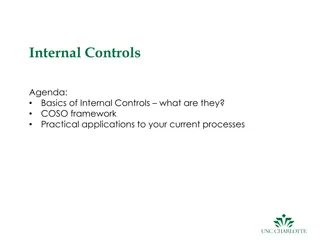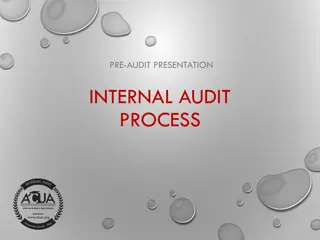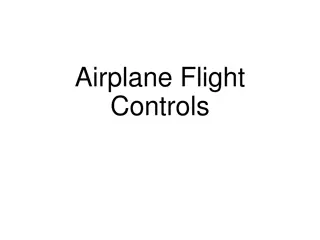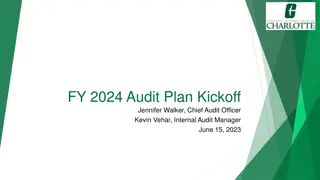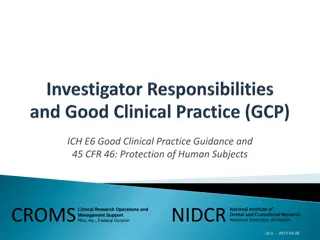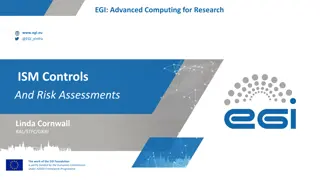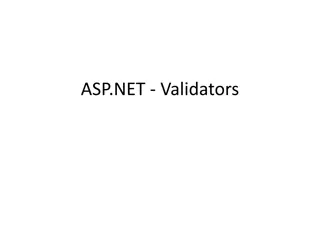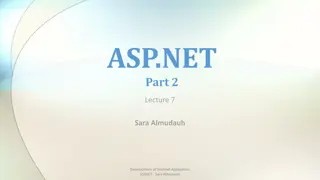Understanding the Impact of 2 CFR 200 on Financial Management Regulations
Explore the implications of 2 CFR 200, the Super-Circular, on financial management, including conflict of interest, mandatory disclosures, interest, supplies, and more. Learn about key definitions, differences between "should" and "must", and new requirements for disclosure. Discover changes in interest amounts, supplies classifications, and conflict of interest rules under 2 CFR 200.
Download Presentation

Please find below an Image/Link to download the presentation.
The content on the website is provided AS IS for your information and personal use only. It may not be sold, licensed, or shared on other websites without obtaining consent from the author. Download presentation by click this link. If you encounter any issues during the download, it is possible that the publisher has removed the file from their server.
E N D
Presentation Transcript
2 CFR 200: Super circular Sponsors of Day Care Homes and Unaffiliated Centers
OMB Circulars have been superseded; utilize the Super-Circular when discrepancies appear between the Super-Circular and the 7 CFR 226 and FNS 796-2 Rev. 4
Overview What is new in the 2 CFR 200 that affects the Financial Management Regulations?
Impact on CCFP Financial Management Conflict of interest & mandatory disclosures Interest Supplies Methods of collection, transmission and storage of information Prior written approval Indirect cost rates Depreciation Single Audit Internal Controls Salaries and wages
2 CFR 200.0 and 200.3-.99 Acronyms and Definitions Key definitions added: Federal Award; Federal financial assistance; Non-federal entity; Pass- through entity; State; Subrecipient; Contractor 99 broad definitions to put uniformity into all federal programs
2 CFR 200 Should vs. Must Should = best practices or recommended approach Must = Required
2 CFR 200.112 & 200.113 Conflict of Interest and Mandatory Disclosure Two new requirements: Must disclose in writing any potential conflict of interest to the Federal awarding agency. Must disclose all violations of Federal criminal law involving fraud, bribery, or gratuity violations potentially affecting the Federal award.
2 CFR 200.305 (Subpart D) Interest Change in amount of interest earned on federal funds can be retained from $250 to $500.
2 CFR 200.314 Supplies Tangible personal property could be defined as supplies if fall below the threshold for equipment. Change made to incorporate computing devices as supplies rather than equipment (if under threshold amount).
2 CFR 200.335 Methods of collection, transmission and storage of information Addresses electronic record requirements Whenever able, collect, transmit and store Federal award information in electronic formats (pdf, jpeg, etc). Federal or pass through must always provide or accept paper versions upon request.
2 CFR 200.407 Prior (Written) Approval First time Feds actually listed the items that require prior written approval.
2 CFR 200.414 Indirect Cost Rates Federal acceptance of already approved IDC New de minimums rate provides for a rate of 10% MTDC to agencies that have never had a negotiated rate. Can be used indefinitely. Negotiated rates must be allowed with pass- through entities.
2 CFR 200.436 Depreciation Use allowance no longer accepted Must use depreciation
2 CFR 200 Subpart F Single Audit Increases audit threshold from $500,000 to $750,000 in federal expenditures Modifies how Risk is defined (Low/High) Audit Findings ( 200.516) FAC sole data warehouse of all Single Audit Reports ( 200.36 & 200.512) Effective for Fiscal Years start after December 26, 2014
2 CFR 200.430 Salaries and Wages Charges to federal awards must be based on records that accurately reflect the work performed
VCA PERFORMANCE STANDARDS AND INTERNAL CONTROLS From the federal regulation
VCA CCFP contractors must be able to account for all CCFP funds. The federal regulations for the Child and Adult Care Food program, Title 7 CFR Part 226, requires new and existing contractors to meet three specific performance standards directly related to the financial management and accounting of the program.
VCA Financial Viability = Financial Resources Administrative Capability = Staffing and Expertise Viability Capability Accountability Program Accountability = Internal Controls
VCA Compliance with these standards must be current, not anticipated or proposed for future operations. Existing contractors must be in compliance with these standards.
VCA Financial Viability Methods of Assessment Recruitment plan, growth of sponsorship Bank statements, tax returns, audited financial statements List of revenues and debts Good/poor standing with other funders General ledgers Demonstration of need and Recruitment Adequate fiscal resources Financial history and trends Budget, revenue and expenses
VCA Administrative Capability Potential Methods of Assessment Organizational chart Job descriptions Written policies and procedures Quality of recordkeeping and documentation Appropriate and effective management practices Adequate number and type of staff
VCA Program Accountability Internal Controls Sufficient funding sources, staffing, and recordkeeping Potential Methods of Assessment Written Internal Controls Observed Practices In ensuring compliance with these performance standards, the State agency should use its discretion in determining to the State agency's satisfaction that the institution meets the performance standards. - 226.6 (b)(1)(xviii) and 226.6 (b)(2)(vii) Compliance with Performance Standards
2 CFR 200.303 Internal controls All institutions must: establish and maintain effective internal control over federal awards that provides reasonable assurance that the non-federal entity is managing the federal award in compliance with federal statutes, regulations and the terms of the award, comply with federal statutes, regulations and terms and conditions of awards, evaluate and monitor compliance take prompt action when instances of non-compliance are identified, and take reasonable measures to safeguard personally identifiable information and other sensitive information.
2 CFR 200.303 Internal controls DOH requires the implementation of policies and procedures that: 1. Safeguard assets from loss or misappropriation 2. Check the reliability of accounting data 3. Promote operational efficiency 4. Encourage adherence to prescribed managerial policies
2 CFR 200.303 Internal controls Your internal control system should assure: 1. Assets are safeguarded against loss 2. Transactions are executed in accordance with management's general or specific authorization 3. Transactions are recorded properly 4. There is an adequate separation of duties
2 CFR 200.303 Internal controls Application of the 2 CFR 200.303 Written internal controls to ensure that program objectives are being met will be collected and examined in the near future.
2 CFR 200.303 Internal controls What to do: Review this section in detail. Read through the Committee of Sponsoring Organizations of the Treadway Commission (COSO) Framework to evaluate your organization s existing internal control structure against these standards. Update or enhance internal controls where needed. Communicate any changes in internal controls to all employees and ensure they are implemented. Have an updated, documented internal control manual when DOH requests this information in the upcoming months.
Internal Controls Policy What you do Procedure How you do it Internal Control How you ensure that it is done in accordance with established procedure
Each Compliance Requirement should have an associated Policy, Procedure, and Internal Control
When non-compliance is noted during a review, policies, procedures, and/or internal controls are weak or ineffective!





